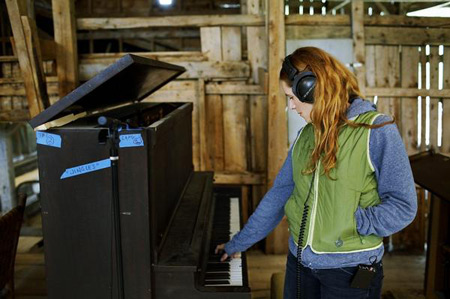
Almost three years have passed since Neko Case released a new studio album, and it's been a very long wait. Her new album, Middle Cyclone is set to break hearts on March 3. We got a tiny taste of what's to come Wednesday night at San Francisco's Herbst Theatre. As part of the City Arts and Lectures series "Talking Music," Neko Case sat down for an interview with screenwriter Callie Khouri (Thelma and Louise and the Katie Holmes and Queen Latifah stinker, Mad Money) and talked about making music, what's it like to be a tour horse, and her desire to die at the hands of a grizzly bear.
Neko Case is indie music's Flannery O'Connor. Although not from the south, she is a southern storyteller, emphasizing the comedy in the macabre. "I hope people find humor in my death," she says, laughing in response to a question about the gothic undertone of her songs. Callie Khouri says she wants to die a fast death, quick and easy, if death is ever the easy way. Neko disagrees and says she would prefer being mauled to death by a large grizzly bear. And her answer makes me miss the blood of the south. Having recently moved from North Carolina to San Francisco, I'm sick with melancholy for the gas pump-and-deer-studded landscape, the woods on either side of the highway, and the loneliness of empty porches and desolate farms. Then I smack myself and remember that I live in San Francisco.
But I find solace in Neko Case's albums. Each one is a capsule of southern gothic antiquity, and the stories she tells are tiny movies like picture frames in a nickelodeon. Khouri asks Neko if she visualizes her songs like movies. “Yeah, I mean I watched a lot of television as a kid. I learned to think visually before I learned to think like a writer. I could appreciate a picture before I could appreciate a turn of phrase." Learning by visuals is a common process in creative development, but having the capacity to put these visuals into equally stunning lyrics is a rare talent. Neko Case is both a writer's singer and a visual artist's singer. She's Flannery O'Connor meets David Lynch, or the Coen Brothers, combining the uncanny both in word and in picture.
The interview goes stale as Khouri talks about her lover, T-Bone Burnett, name-dropping him so much that I begin to silently curse the day he met Robert Plant, and she tells stories from her own life, which are boring in comparison to Neko's tales of being homeless and working for meager pay: “I was so anemic at one point my boss told me to stop wearing so much makeup. He thought it was pancake makeup, but I was like, no, I’m just really white.”
Khouri finally puts away her pedestrian questions and Neko steps behind the microphone with guitarist Paul Rigby and backing vocalist Kelly Hogan. They begin with the title track off the new album, and Paul Rigby delicately strums his guitar, providing a simple background to Neko’s like-honey voice singing, “Can’t give up acting tough/ It’s all that I’m made of/ Can’t scrape together quite enough/ To ride the bus to the outskirts of the fact that I need love.”
Neko can subvert strength with vulnerability in a no way no one else can, not only in her words but with her voice. She can drown out a bulldozer and harmonize with a single cricket. And she’s a fantastic pop singer, obvious enough with The New Pornographers, but also with another new song off Middle Cyclone called “People Got a Lotta Nerve.” She tells us this song was inspired from headlines like, “Lion Kills Man” and “Crocodile Eats Woman.” “Cause, you know, they’re animals and that’s what they do, but people still act shocked,” she says before launching into the twangy upbeat pop number -- but upbeat in a good way, like “John Saw That Number” from Fox Confessor Brings the Flood.
Next is an aching cover of Harry Nilsson’s “Don’t Forget Me,” and I’m reminded why Neko Case would make a better covers album than Cat Power. She plays “Dirty Knife” and ends with “That Teenage Feeling,” the song you might listen to on the radio before a high school prom in Kansas, circa 1954.
She pulls back that wild mane of hair and waves goodbye, providing the shortest Neko Case live experience I’ve witnessed. The audience is a bit stunned. But then I look at my watch and realize that the interview was almost two hours long, so all is forgiven. I walk out into the Pacific air, but I’m thinking of Carolina, where I discovered Neko Case’s music in the back roads of southern tobacco towns, knowing I’m able to carry the south with me in San Francisco because of Neko Case.